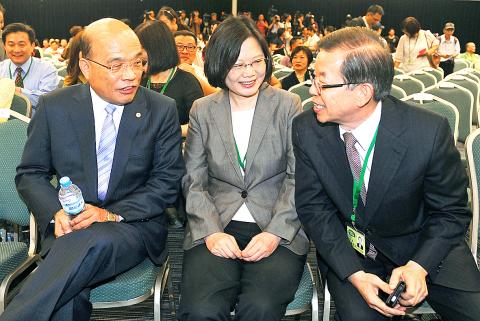The Democratic Progressive Party’s (DPP) leadership for the next two years took shape yesterday during elections at the annual congress as DPP Chairperson Tsai Ing-wen (蔡英文) gained an ability to influence the party’s power structure for the first time.
Tsai, who neither established her own alliance nor became affiliated with any grouping when she served as chairperson between 2008 and 2012, yesterday saw allies voted onto the party’s key decisionmaking bodies — the Central Executive Committee and the Central Standing Committee.
While Tsai has been reluctant to recognize her “special circle” as a faction, she now has five allies among the 30 elected members of the Central Executive Committee and two confidants — DPP Legislator Chen Ming-wen (陳明文) and her former presidential running mate, Su Jia-chyuan (蘇嘉全) — among the 10 elected members of the Central Standing Committee.

Photo: Liao Chen-huei, Taipei Times
This will make it easier for Tsai to consolidate her power in the party and to initiate proposals or defend her policies.
It also highlighted Su Jia-chyuan’s official return to the party’s power structure after a hiatus for almost two years since the 2012 presidential election and the controversy over a residence he built on land zoned solely for agricultural use in Pingtung County.
The biennial elections for the Central Executive Committee, the Central Standing Committee and the Central Review Committee, which oversees the DPP’s internal affairs, were held during yesterday’s congress.
The Central Standing Committee, the DPP’s highest decisionmaking body, has 17 members: the chairperson, three DPP caucus executives, three mayors and 10 elected members — who are chosen from among the 30-person Central Executive Committee.
Almost all the DPP’s former factions fared equally winning seats on the Central Standing Committee. The former New Tide faction won two seats, as did a “faction” of Tsai, Yu and Hsieh, while former DPP chairman Su Tseng-chang’s (蘇貞昌) faction won one seat, as did the Green Friendship Alliance.
The same balanced of power is now found on the Central Executive Committee after the election, with New Tide and the Tsai-Yu-Hsieh side each winning five seats, followed by Greater Kaohsiung Mayor Chen Chu’s (陳菊) faction, which has four seats. Su’s faction and the Green Friendship Alliance each won three seats.
Central Executive Committee member Hung Chi-kune (洪智坤) failed to win re-elected due to a lack of support from any faction.
Eleven Central Review Committee members were also elected.
The DPP voted to ban party factions during its national congress in June 2006, though the groupings are still recognized by many people inside and out of the party.
The Chinese Nationalist Party (KMT) banned party factions in January 2008.

A magnitude 4.9 earthquake struck off Tainan at 11:47am today, the Central Weather Administration (CWA) said. The hypocenter was 32.3km northeast of Tainan City Hall at a depth of 7.3km, CWA data showed. The intensity of the quake, which gauges the actual effect of a seismic event, measured 4 in Tainan and Chiayi County on Taiwan's seven-tier intensity scale, the data showed. The quake had an intensity of 3 in Chiayi City and County, and Yunlin County, while it was measured as 2 in Kaohsiung, Nantou County, Changhua County, Taitung County and offshore Penghu County, the data showed. There were no immediate reports of

‘DENIAL DEFENSE’: The US would increase its military presence with uncrewed ships, and submarines, while boosting defense in the Indo-Pacific, a Pete Hegseth memo said The US is reorienting its military strategy to focus primarily on deterring a potential Chinese invasion of Taiwan, a memo signed by US Secretary of Defense Pete Hegseth showed. The memo also called on Taiwan to increase its defense spending. The document, known as the “Interim National Defense Strategic Guidance,” was distributed this month and detailed the national defense plans of US President Donald Trump’s administration, an article in the Washington Post said on Saturday. It outlines how the US can prepare for a potential war with China and defend itself from threats in the “near abroad,” including Greenland and the Panama

The Chinese Nationalist Party (KMT) is maintaining close ties with Beijing, the Democratic Progressive Party (DPP) said yesterday, hours after a new round of Chinese military drills in the Taiwan Strait began. Political parties in a democracy have a responsibility to be loyal to the nation and defend its sovereignty, DPP spokesman Justin Wu (吳崢) told a news conference in Taipei. His comments came hours after Beijing announced via Chinese state media that the Chinese People’s Liberation Army’s Eastern Theater Command was holding large-scale drills simulating a multi-pronged attack on Taiwan. Contrary to the KMT’s claims that it is staunchly anti-communist, KMT Deputy

RESPONSE: The government would investigate incidents of Taiwanese entertainers in China promoting CCP propaganda online in contravention of the law, the source said Taiwanese entertainers living in China who are found to have contravened cross-strait regulations or collaborated with the Chinese Communist Party (CCP) could be subject to fines, a source said on Sunday. Several Taiwanese entertainers have posted on the social media platform Sina Weibo saying that Taiwan “must be returned” to China, and sharing news articles from Chinese state media. In response, the Mainland Affairs Council (MAC) has asked the Ministry of Culture to investigate whether the entertainers had contravened any laws, and asked for them to be questioned upon their return to Taiwan, an official familiar with the matter said. To curb repeated